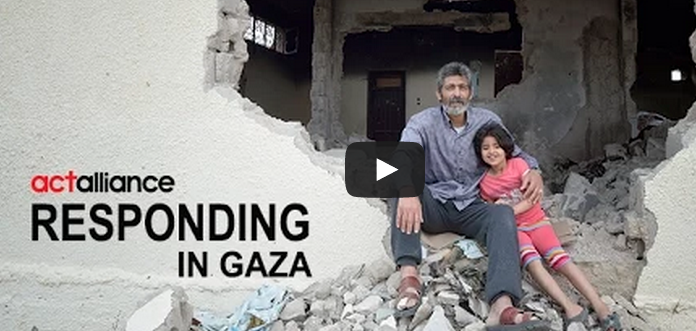“Personally I feel that what we do is like a drop in the ocean. But when I see the smiles on the faces of the people we try to assist, I realise how important this drop in the ocean is…” a statement by Azzam Alsaqqa, from ACT member Christian Aid, which has for years been working to provide humanitarian relief for people living in the Occupied Palestinian Territories (oPt).
On 8 July 2014, Israeli forces launched military operations on Gaza that lasted 50 days. The onslaught included frequent aerial bombardments, which according to the UN killed 2,200 people, including more than 1,600 civilians, a third of whom were children. In total, 11,000 Palestinians were injured, 1,000 of whom were permanently disabled. During the conflict, five Israeli civilians and 60 Israeli soldiers were also killed. Over a quarter of the 1.8 million people living in Gaza have been displaced because of the conflict, and the destruction has left approximately 108,000 people homeless. Tens of thousands of homes have been reduced to rubble, and hospitals and educational establishments damaged or destroyed. Extensive infrastructure damage left many areas without electricity and around 450,000 people without access to clean water, posing a major threat to public health.
Providing life saving relief
ACT members provided support primarily to those who have been identified as vulnerable, such as children, pregnant mothers, the injured and the grieving. Thirteen hundred expectant mothers received antenatal visits from healthcare professionals in the targeted district, and 100 newborn kits were distributed. Alliance members provided 350 hygiene kits and 27 medical kits to assist injured patients, and psychosocial projects were set up in the most heavily bombed areas of Gaza to try to heal emotional wounds.
The blockade and conflict made humanitarian access challenging, however food was distributed where possible to families who had lost their livelihoods, and 11,000 one-litre bottles of mineral water were provided to those without access to clean water. Alliance members also provided 835 children in the Shijia area with vouchers for school equipment, such as stationery.
Ongoing crisis
The Israeli blockade of Gaza, by land, air and sea, has continued since 2007 and severely restricts the entry of goods and food to Gaza. The blockade has been heavily criticised by the UN, as well as humanitarian and human rights organisations. Currently, building materials that are needed to rebuild after the massive destruction caused by the bombardments are heavily restricted. According to the United Nations Relief and Works Agency for Palestine Refugees in the Near East, approximately 1 million of the 1.8 million population were already receiving food aid before the recent escalation of violence.
ACT members have been working in Gaza for more than a decade.
Fawzi Abu Jame’a, with his 7-year old daughter Raghad, sit in the ruins of what was once his parents’ home Khan Yunis, Gaza. Houses in the area were destroyed by Israeli air strikes during the 2014 war between the state of Israel and the Hamas government of Gaza. ACT/Paul Jeffrey

